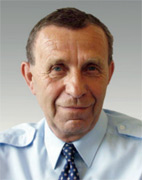
Vladimír Dvořák (1934–2007)
Solid state physicist, the most prominent Czech scientist in the theory of ferroelectricity and structural phase transitions, for the whole productive life affiliated with the Institute of Physics, its director in 1993-2001, member of the Learned Society since 1995. The main protagonist of the revolutionary reforms in the Institute of Physics after 1989. To commemorate his work and personality, the Institute of Physics decided to organize an annual festive Dvořák lecture, given by prominent internationally renowned scientists in the field related to the research pursued at the Institute of Physics.
Wed, 12/06/2013 - 15:00 - 16:00
Peter Jenni (University of Freiburg, Germany and CERN, Geneva, Switzerland)
Wed, 06/06/2012 - 15:00 - 16:30
Prof. Allan H. MacDonald (University of Texas at Austin, USA)
Wed, 08/06/2011 - 15:00 - 17:00
Prof. Dieter Vollhardt (University of Augsburg, Germany)
Wed, 23/06/2010 - 15:00 - 17:00
Prof. Anton Zeilinger (University of Vienna, Austria)
Wed, 10/06/2009 - 15:00 - 18:00
prof. Yoshihiro Ishibashi (Nagoya University, Japan)
Copyright © 2008-2010, Fyzikální ústav AV ČR, v. v. i.